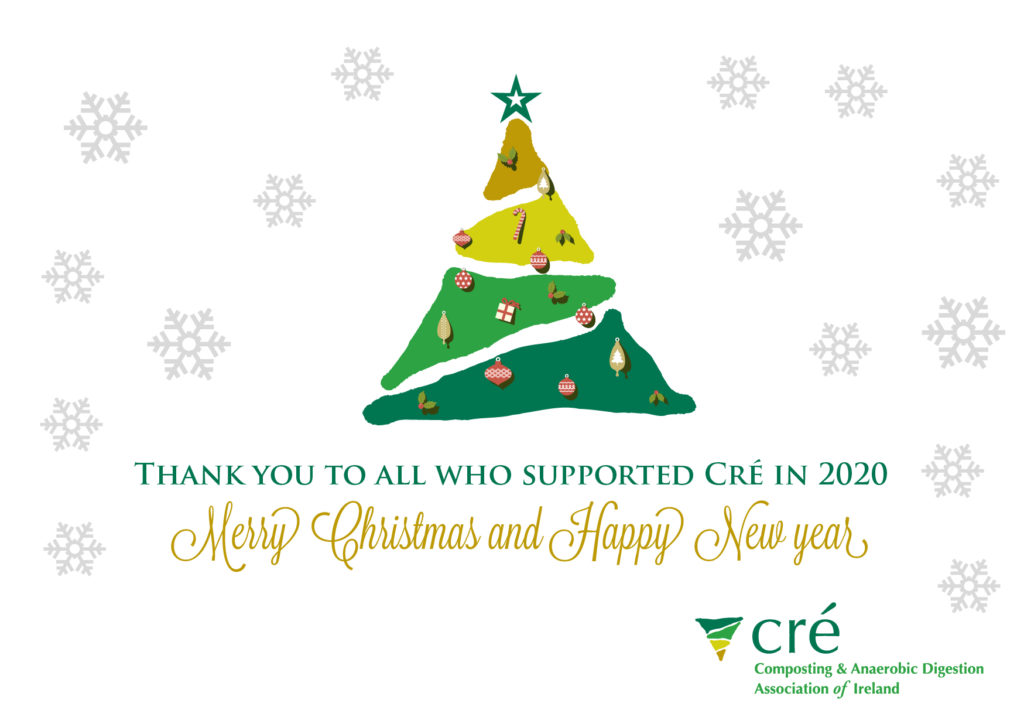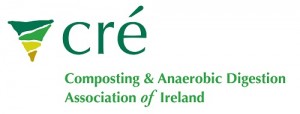
Public Consultation on Research Project: To Develop National End of Waste Standards for Quality Compost and Digestate
Cré is seeking views on the Research Project ‘To Develop National End of Waste Standards for Quality Compost and Digestate’
In Ireland, there are no national End-of-Waste Criteria for quality compost and digestate derived from source-separated materials. In EPA licences for composting and anaerobic digestion (AD) plants, there is a quality standard as part of the licences, however in old licences the parameters and limit values vary considerably and in the recent licences the parameters and limit values have been adopted from the national compost standard I.S. 441 for compost but also for AD plants.
This project has examined best European practices as well as quality standards in Canada, America and Australia; and proposes an approach for End-of-Waste Criteria for compost and digestate in Ireland. In addition, the project has developed a quality standard for digestate and an updated compost standard, which are used as part of the End-of-Waste Criteria.
The project findings will inform the approach that should be taken to develop national End-of-Waste Criteria for compost and digestate in Ireland.
All submissions are welcome and will be considered in the finialisation of the report.
Confidential or commercially sensitive information should be clearly identified in your submission. By responding to the consultation, respondents consent to their name being shared with the steering committee.
Submissions must be made using this template to the following email address: info@cre.ie
No other format will be accepted, this is to ensure we capture all the comments and to be able to consider them all in the context which they are submitted.
The consultation document can be downloaded here
The closing date for submissions is 5pm, Friday 12th, June, 2020.
ACKNOWLEDGEMENTS This is a consultation document on the research report funded by the EPA Research Programme 2014–2020. The programme is financed by the Irish Government. It is administered on behalf of the Department of Communications, Climate Action and the Environment by the EPA, which has the statutory function of co-ordinating and promoting environmental research.
RED C Research on Commercial food waste bin
Press Release
21.10.2019
A third of Irish businesses surveyed don’t have a food waste bin
A new survey from RED C Research* has found that despite legislation for the last ten years requiring businesses to have and use a food waste bin, 33% do not have one.
The research highlights that among those who don’t have a food waste bin, the main reasons are that their waste collector did not provide it to them (30%), they have no space for the extra bin (14%) and 10% did not know about food waste bins. Cost of collection being expensive was lower down the list of reasons for not having a food waste bin, with only 6% of the businesses surveyed mentioning it.
The main reason why 66% of businesses reported using a food waste bin were because it is the law (37%), it’s environmentally friendly (31%) and it leaves other waste cleaner for recycling (24%).
Many businesses report that they are using the weight data provided by waste collectors to examine if they are producing too much food waste (67%) and have systems in place to reduce food waste (83%).
According to the businesses surveyed, infographics of what goes into different waste bins (98%), food waste reduction toolkit (88%), online videos on correct use of food waste bins/segregation of waste (77%) would be useful to help them recycle more food waste.
Percy Foster CEO of Cré said, “The findings show that there still is a lot more work to do in the commercial sector to recycle food waste. The Government will be consulting on the review of waste policy in Ireland and these findings will contribute to this review.”
Speaking on behalf of the three Regional Waste Offices, Joanne Rourke, Resource Efficiency Officer with the Eastern-Midlands Waste Regional Office commented, “While it is encouraging that two thirds of businesses are obeying the law and segregating food waste and indeed that many of these are doing so for environmental reasons, it is imperative that the remaining one third of businesses who are not currently using their brown bin begin doing so.”
“The Regional Waste Offices and the other stakeholders are currently developing resources to support businesses in addressing the deficits and difficulties they may be encountering in segregating their waste. Sending organic waste, such as food, to landfill has been illegal in the commercial sector since 2009 and food disposed of this way actually contributes to climate change through the gases it releases while breaking down. By properly segregating organic waste, businesses can play an important part in reducing waste to landfill and mitigating climate change.”
Odile Le Bolloch of the EPA’s Food Waste Prevention Team said; “It takes a lot of resources to put food on our tables and when food is wasted, the resources used to produce that food are wasted too. This impacts climate change, our local environment and business costs. Recent EPA-funded research[1] found that the food services sector generates over 250,000 tonnes of food waste each year with a very considerable cost in terms of resource-use and business overheads – estimated at over €300M for the hospitality sector alone. To meet this environmental and financial challenge, food businesses need to measure the food being discarded, and then take action to reduce avoidable wastage.”
“Food businesses can show their commitment to reducing food waste by signing up to Ireland’s Food Waste Charter, a national initiative led by the EPA targeting food waste in the business sector. For businesses that want to reduce their food waste or need help to get started, support is available to businesses who sign the charter, including a food waste reduction toolkit.”
Download a copy of the report RED C- Commercial Food Waste Survey – Sept 2019
ENDS
Notes:
This survey was co–funded by the Department of Communication, Climate Action and Environment, the Environmental Protection Agency, the Connaught-Ulster Waste Region, the Southern Waste Region, the Eastern–Midlands Waste Region and Cré – Composting and Anaerobic Digestion Association of Ireland.
*RED C Research conducted the research in August 2019 among the members of the Restaurant Association of Ireland, Vintner Federation of Ireland, Small Firms Association and IBEC (sample of 151 businesses).
Further information on food waste in commercial sectors and the Food Waste Charter can be found at https://foodwastecharter.ie/
[1] https://foodwastecharter.ie/wp-content/uploads/2019/07/CTC-Research-Report-EPA-282.pdf
For further information please contact:
Maeve Kelly
Grapevine Communications
Email: maeve.grapevinepr@gmail.com
Telephone: 087 6895930
CRÉ CERTIFICATION SCHEME NOW OPEN
CRÉ IS DELIGHTED TO ANNOUNCE THAT THE CRÉ CERTIFICATION SCHEME IS NOW OPEN FOR APPLICATIONS.
Cré recently received a lovely letter from Sir David Attenborough in which he said “Thank you for telling me about your admirable scheme”.
Cré is delighted to have such an experience team taking over the management of the scheme.
Dermot O’Doherty and Dearbhail Wheston are the independent directors of the certification body – Cré Certification Ireland.
Ruth Robertson is the scheme manager and Eoin Bird is the scheme inspector.
The Certification Committee comprises Dr. Billy Fitzgerald (former head of Environmental Science IT Sligo), Josef Barth (Informa Consultants, Germany) and Henrik Lystad (Norwaste, Norway).
Over the next few months products will be tested under the scheme rules.
The scheme website is www.compostable.ie
Any company interested in getting more details about the scheme are to email certification@cre.ie
ENDS
Minister Creeds Helps Awards Certificates in Composting
Minister Creeds Helps Awards Certificates in Composting
Last week at an Awards Ceremony held in the Royal College of Physicians, Minister Creed helps hand out the ‘Cré – Institute of Technology Sligo Certificate in Compost Facility Operation’.
With increasing amount of composting happening the trained students are all actively working in the sector as either operating plants or regulating plants. 22 people completed the course and were various backgrounds of being regulators, compost site operators and consultants.
The use of compost in its role of carbon sequestration in Irish soils was discussed at the event and everyone acknowledge the role to keep carbon locally in Irish soils is needed. A recent survey showed that nearly 100,000 of compost is generated in Ireland this is set to increase rapidly in the next few years as more poultry manure and brown bin materials is composted.
ENDS
Caption: Minister Creed, Dr. Michele Glacken (IT Sligo) and Percy Foster (Cré) with the students who got awarded the Certificate in Compost Facility Operation.
“Mobilising an Irish Biogas Industry with Policy and Action”
“Mobilising an Irish Biogas Industry with Policy and Action”
Press Release: Immediate Release
18th July 2019
Biogas can addresses Ireland’s declared Climate Emergency with Government Policy and Action now
Today, the Irish Bioenergy Association (IrBEA) and Cré- Composting and Anaerobic Digestion Association of Ireland launch their joint policy document calling for a biogas support scheme titled “Mobilising an Irish Biogas Industry with Policy and Action”. This document developed following consultation with members and key stakeholders in the sector, sets out a road map for how the government target of 1.6Twh of biomethane by 2030 can be achieved on a phased basis over the next number of years. The document provides the Irish government with an industry roadmap for the role out of a meaningful Irish biogas industry. This document addresses the Joint Oireachtas Committee on Climate Action call for a strategy to be developed for Anaerobic digestion and also the Government Climate Action Plan action on biomethane injection. This policy document articulates a vision from the industry and outlines the key principles which will need to be followed for the growth and development of a successful Irish biogas industry.
Speaking at the policy document launch, Seán Finan IrBEA CEO says “Our vision is for the Irish biogas industry to be developed on a phased basis to achieve the government climate action plan target of 1.6Twh (200MW) of biomethane injection by 2030 or before. A biogas support scheme will be required to bridge the cost gap between the current cost of production of biogas and current sale price of fossil gas. In the short term, we would like to see an initial phase of 65MW of biomethane funded by the government. The initial 65MW can be achieved by 25 medium to large scale biogas plants which are strategically located across the county and close to the gas grid. The initial phase would deliver 400 jobs and abate 500,000 tonnes of CO2 with a biogas support scheme costing €40 million”
Percy Foster, CEO of Cré said “we are delighted to have worked closely with our colleagues in IrBEA in producing this joint policy document. We firmly believe a phased approach in developing a sustainable biogas sector is the way forward. Our document outlines in detail the many significant benefits Biogas has, which go unrecognised by many key stakeholders. It helps meet renewable energy targets, diversification for farmers, creates local jobs, reduces the need for chemical fertilisers and the avoidance of greenhouse gas emissions are just a few examples”.
The joint document clearly articulates that a whole of government approach is required to funds the biogas support scheme required. A number of funding options are available and should be explored. An Irish biogas industry will deliver significant benefits to the country across a least 7 different Government department. Some of the different Government funding options available include: the introduction of a PSO levy on fossil gas, a financial contribution from all of the different government departments that can realise a benefit from the industry creating a whole of Government fund or ringfencing some of the carbon tax budget. Policy and action is required now from Government to ensure this industry develops in Ireland which is mainstream in many other European countries for many years.
IrBEA Cre Biogas Policy Summary Final
IrBEA Cre Biogas Policy Paper Final_1
Cré Welcomes Opening of Renewable Heat Scheme for Biogas
Press Release (05.06.2018)
Cré Welcomes Opening of Renewable Heat Scheme for Biogas
On Tuesday Minister Bruton opened the second phase of the Support Scheme for Renewable Heat (SSRH), which will provide operational support anaerobic digestion heating systems and biomass boilers.
Percy Foster CEO of Cré said “We welcome this initiative from Minister Bruton and we particular see the food processing sector changing their processes as it will encourage them to install biogas plants to treat their own waste and to displace fossil fuels which would have been used for heating purposes within their processes”
Details on how operators can apply for their scheme should contact Sustainable Energy Authority of Ireland (SEAI)- https://www.seai.ie/sustainable-solutions/support-scheme-renewable-/ (ssrh@seai.ie or 01-248-4982)

